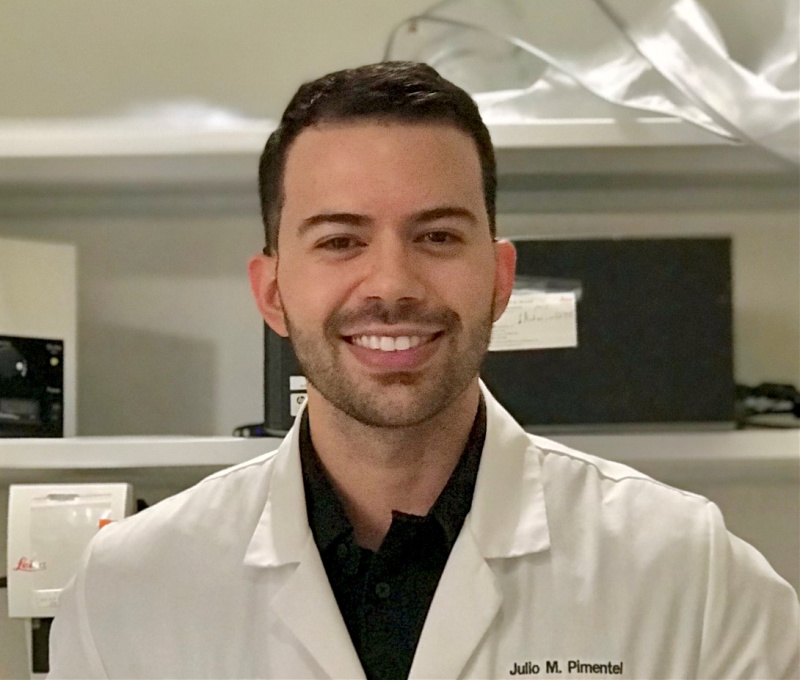Julio Pimentel, a first-generation Hispanic/Latino doctoral candidate in the Wayne State University School of Medicine’s Cancer Biology program has been selected for a second time to receive the National Latino Leader Award and a scholarship to attend and present at the 2021 Society of Advancing Chicanos/Hispanics and Native Americans in the Sciences Conference.
Entering his fourth year in the Ph.D. program in August, Pimentel, originally from Turlock, Calif., will present “Targeting TRAIL resistance in triple-negative breast cancer cells” virtually during the Oct. 25-29 conference.

“I am grateful for the recognition that I received for our work last year, and more so to have been selected for the honor to present again this year,” said Pimentel, whose mentor is Gen Sheng Wu, Ph.D., professor of Oncology and of Pathology. “To be recognized as a role model within my community stems from the fact that I may have reached a certain milestone that has not been observed in a long time. I am aware that my conduct and behavior sets some standard that is admired among aspiring Latino/Latina students. It’s a massive compliment.”
Pimentel, who has been supported during his training by a Dean’s Diversity Fellowship and the National Institutes of Health’s Ruth L. Kirschstein National Research Service Award, first won the National Latino Leader Award in 2020.
The Society of Advancing Chicanos/Hispanics and Native Americans in the Sciences is dedicated to fostering the success of Chicano/Hispanics and Native Americans in attaining advanced degrees, careers and positions of leadership in science, technology, engineering and math. The organization’s conference is the largest multidisciplinary and multicultural STEM diversity event in the country.
Pimentel’s research focus in the Cancer Biology Graduate Program is overcoming tumor necrosis factor-related apoptosis-inducing ligand, or TRAIL, resistance in triple negative breast cancer.
Triple-negative breast cancer, or TNBC, is an aggressive disease that does not respond to widely-used targeted endocrine therapies because of the absence of progesterone, estrogen and HER2 receptors. While previous studies indicate the majority of TNBC cells are highly sensitive to TRAIL-induced apoptosis, the development of TRAIL resistance limits its efficacy. Pimentel’s study evaluated the effects of protein phosphatase 2A, or PP2A, inhibition on TRAIL-induced cell death in TRAIL-resistant TNBC cells. He generated two TRAIL-resistant cell lines from TRAIL-sensitive parental cells (MDA-MB-231 and SUM159), and found that both TRAIL-resistant cell lines are sensitive to the PP2A inhibitor LB-100 compared to their corresponding TRAIL-sensitive counterparts. The findings suggest that the inhibition of PP2A activity could be a novel therapeutic strategy for overcoming TRAIL resistance in triple-negative breast cancer.
The Wayne State University Board of Governors in March recognized Pimentel for exhibiting “Profiles in Warrior Strong” during 2020. The recognition acknowledges positive accomplishments continued throughout the university community despite the challenges posed by the COVID-19 pandemic.
In 2019, Pimentel won first place in poster presentations at the Barbara Ann Karmanos Cancer Institute Junior Faculty Research/Retreat, and the Cancer Biology Director's Award. He was selected in 2018 for a WSU Dean's Diversity Fellowship, designed to attract new doctoral students and support departmental recruitment of students who demonstrate academic excellence and are underrepresented in their disciplines. In addition to continuing his research during the pandemic, he gave a virtual presentation to minority high school students interested in STEM in the FocuSSTEM NextGen program and was nominated as a Latino role model shaping the world by the Latino Community Stage.